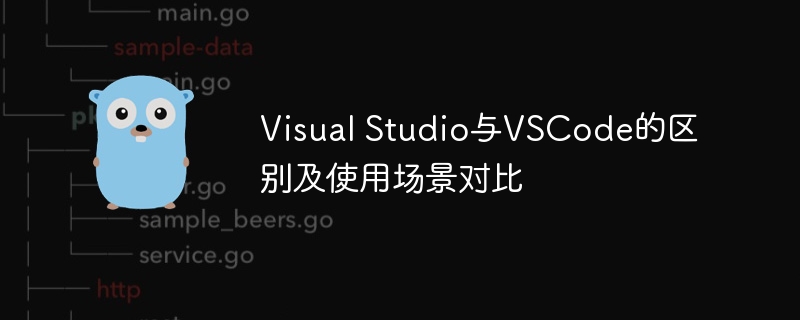Home >Backend Development >Golang >The difference between Visual Studio and VSCode and comparison of usage scenarios
The difference between Visual Studio and VSCode and comparison of usage scenarios
- PHPzOriginal
- 2024-03-25 18:18:041382browse

The difference between Visual Studio and VSCode and comparison of usage scenarios
In the field of program development, Visual Studio developed by Microsoft and VSCode developed by the open source community are two projects that have attracted much attention Integrated development environment (IDE). Both provide rich functions and extensions, but have different features and usage scenarios in some aspects. This article will make a detailed comparison between Visual Studio and VSCode, and give applicable usage scenarios and code examples based on their characteristics.
Visual Studio
Visual Studio is a powerful IDE launched by Microsoft for developing Windows applications. It has rich functions, including debugging, built-in project templates, graphical interface design tools, etc. Visual Studio is suitable for the development of C#, C, VB.NET and other languages, especially when developing complex desktop applications.
Advantages:
- Powerful debugging function: Visual Studio has a powerful built-in debugger that can help developers quickly locate and solve bugs.
- Rich project templates: Visual Studio provides a variety of project templates, making creating new projects easier and more convenient.
- Integrated interface design tools: For application development that requires a graphical interface, Visual Studio provides powerful design tools, such as Windows Forms, WPF, etc.
Applicable scenarios:
- Desktop application development: Visual Studio is suitable for developing desktop applications, such as Windows Forms applications, WPF applications, etc. .
- Cross-platform development: Visual Studio supports the development of cross-platform applications using .NET Core.
Code sample (C#):
using System;
class Program
{
static void Main(string[] args)
{
Console.WriteLine("Hello, Visual Studio!");
}
}VSCode
VSCode is a lightweight, fast and extensible open source text editor suitable for a variety of Development of programming languages. VSCode has powerful code editing functions and a rich plug-in ecosystem. Many developers like to use VSCode for rapid development and debugging.
Advantages:
- Quick startup and operation: VSCode starts quickly and is suitable for rapid small project development.
- Rich plug-in support: VSCode has a powerful plug-in system that can easily extend its functions.
- Cross-platform support: VSCode supports operating systems such as Windows, Mac and Linux.
Applicable scenarios:
- Web development: For front-end development and lightweight back-end development, such as Node.js, etc., VSCode is a Not a bad choice.
- Lightweight project development: VSCode is very suitable for small projects or scenarios that require rapid prototype development.
Code sample (JavaScript):
function greet() {
console.log("Hello, VSCode!");
}
greet();Summary
Visual Studio and VSCode each have their own characteristics and advantages, choose the appropriate tool in different development scenarios is very important. If you need to develop complex desktop applications or need rich visual tool support, Visual Studio is a good choice; for rapid Web development or lightweight project development, you can consider using VSCode to improve development efficiency.
Whether you choose Visual Studio or VSCode, you should choose based on specific project needs and personal preferences to better complete development tasks. I hope this article will be helpful to developers by comparing the differences between the two and providing usage scenarios and code examples.
The above is the detailed content of The difference between Visual Studio and VSCode and comparison of usage scenarios. For more information, please follow other related articles on the PHP Chinese website!

